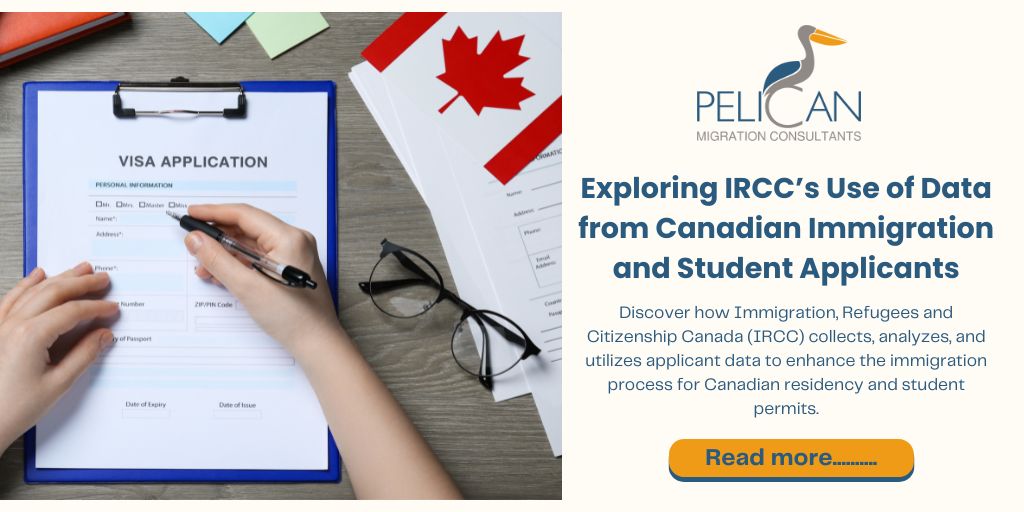
When applying to immigrate to Canada or study there, the data you provide becomes a critical part of how Immigration, Refugees, and Citizenship Canada (IRCC) evaluates, processes, and makes decisions on applications. IRCC’s data collection and analysis methods are vital for determining eligibility, assessing admissibility, and continuously improving the immigration system. This guide explores how IRCC uses information from various applications, whether for permanent residency, temporary visas, or student permits, and how understanding this can benefit applicants.
The Role of Data in Canadian Immigration
Data collected by IRCC does more than process your application—it plays a strategic role in shaping and enhancing Canada’s immigration system. IRCC uses applicants’ data for a variety of purposes:
- Program Eligibility Assessment: Evaluates applicants' qualifications for specific programs, such as Express Entry or the Provincial Nominee Program (PNP).
- Admissibility Checks: Confirms applicants’ compliance with Canada’s legal, medical, and security standards.
- Decision-Making: Uses data to make informed decisions on individual applications.
- Policy Development: Analyzes trends to help formulate policies that address Canada’s changing needs.
- Service Improvement: Enhances the delivery of immigration programs and client satisfaction.
Through these functions, IRCC not only processes applications efficiently but also combats fraud and monitors compliance with immigration laws. IRCC’s approach has evolved, especially with its 2023-26 Data Strategy, which emphasizes using data to enhance agility and improve client service.
IRCC holds an impressive number of open datasets, many of which are available to the public, highlighting its commitment to transparency. In fact, IRCC hosts 11 of the top 25 most downloaded Canadian government datasets, illustrating a high public interest in immigration data.
How IRCC Uses Data for Permanent Residency Applications
Permanent residency applications, such as those submitted through Express Entry or PNP, involve a thorough data collection process that supports IRCC’s decision-making and policy shaping. Here’s a breakdown of what information IRCC collects and how it’s used:
Information Collected from PR Applicants
IRCC gathers detailed information in the following categories:
- Personal Details: Name, birth date, contact information, marital status.
- Biographical Data: Education, work history, family details, citizenship.
- Official Documents: Passport numbers, criminal background checks, military records.
- Medical Information: Health records, biometrics.
- Immigration History: Previous applications, entry/exit records.
- Employment Details: Job offers, Labor Market Impact Assessments (LMIA).
How This Data Is Used
IRCC uses this information to:
- Determine Eligibility and Admissibility: Ensure applicants meet the requirements of specific programs and can support themselves in Canada.
- Share Information with Relevant Authorities: For example, the Canada Border Services Agency and the Royal Canadian Mounted Police handle security checks, while provincial authorities verify PNP details.
- Evaluate Program Effectiveness: Analyzes anonymized data to track trends and adjust programs accordingly.
Data from permanent residency applications plays a significant role in spotting trends and evaluating program success. For example, IRCC reviews applicants’ entry and exit records to ensure family sponsors live in Canada, a step that helps reduce fraud and maintain the integrity of the immigration process.
How IRCC Manages Data from Temporary Resident Visa Applications
For temporary residents, including those applying for work permits, visitor visas, or study permits, IRCC has introduced an efficient data-driven processing system that speeds up application reviews.
Streamlined Processing with Data Analytics
IRCC’s analytics system sorts temporary resident visa applications by complexity, speeding up simpler applications for those who’ve previously visited Canada or provided complete documentation. The system reviews the following application components:
- Previous travel history to Canada.
- Document completeness.
- Complexity of the case.
- Accuracy of submitted documents.
- Biometrics needs.
Applications labeled as "routine" get processed faster, especially for those who’ve visited Canada within the past ten years. IRCC’s analytics help streamline these applications, though IRCC officers always make the final decisions. The process still includes:
- Sorting applications based on complexity.
- Flagging routine or complex cases.
- Verifying eligibility through officer review.
- Running security checks.
- Issuing a final decision from IRCC officers.
Privacy Measures and Fairness in Processing
IRCC has strong privacy protections in place to ensure data security and fairness. Safeguards include:
- Regular checks to prevent bias.
- Adherence to privacy assessments.
- Compliance with anti-discrimination laws.
- Consistent system monitoring to improve decision accuracy.
With these measures, IRCC ensures applicants are treated fairly, with applications randomly selected for manual review to ensure quality control and uphold data integrity.
The Use of Data for International Student Applications
International students considering Canada as a study destination should understand IRCC’s data processes, as these significantly affect application outcomes. Here’s a closer look at how IRCC handles international student data:
Information Collected from International Student Applicants
When applying for a study permit, international students provide information in these areas:
- Personal Information: Name, birth date, contact information.
- Academic Records: Education history, chosen program.
- Financial Data: Proof of funds, financial statements.
- Documentation: Passport details, biometrics.
- Program Details: Intended institution and program duration.
How IRCC Uses This Information
IRCC uses data from student applicants for several purposes:
- Enrollment Verification: Confirms enrollment in a designated learning institution (DLI).
- Monitoring Study Permit Conditions: Ensures compliance with study permit terms.
- Transition Tracking: Monitors students who transition to post-graduation work permits.
To maintain the integrity of the international student program, IRCC works closely with designated institutions, provincial governments, and border services. Advanced analytics aid in processing times, allowing for quicker and more informed decisions on study permit applications. This system also supports IRCC in identifying trends, such as popular fields of study and student retention rates in Canada.
FAQs
1. Are There Limitations to the Data IRCC Collects?
Yes, IRCC follows strict privacy regulations and collects only information relevant to the immigration or study permit process. Sensitive information is handled with care and limited access.
2. Does IRCC Share Applicant Data with Other Organizations?
In certain cases, IRCC may share limited information with government agencies for security or law enforcement purposes. These actions comply with Canadian privacy laws and regulations.
3. How Often Does IRCC Update Its Immigration Data?
IRCC updates its systems regularly to keep applicant data current, ensuring accurate decision-making and timely processing.
IRCC’s focus on privacy, transparency, and accuracy underscores its commitment to providing a fair, efficient, and secure immigration experience for applicants. Whether you’re applying for permanent residency, a temporary visa, or a study permit, IRCC’s data management strategies help streamline the process and offer a reliable pathway to Canada.
How Pelican Migration Consultants Can Guide You Through IRCC Data Requirements
Navigating IRCC's data requirements can feel overwhelming, especially with detailed documentation and security standards in place. Pelican Migration Consultants offers expert guidance, ensuring that your application data is complete, accurate, and optimized for success. Here are five ways Pelican Migration Consultants can assist you:
- Comprehensive Document Review
Our team conducts a thorough review of all required documents, such as your personal, medical, and financial records, ensuring they meet IRCC’s standards. This meticulous approach minimizes the chances of errors and delays during processing. - Personalized Guidance for Eligibility
Pelican Migration Consultants evaluates your eligibility based on your qualifications, personal information, and immigration goals, helping you choose the most suitable program—be it Express Entry, PNP, or a study permit. We align your profile to meet the specific requirements for your chosen pathway. - Expert Assistance with Security and Admissibility Checks
With IRCC's stringent admissibility requirements, our experts help you prepare for security, health, and criminal checks, addressing any areas of concern proactively. This includes guidance on obtaining necessary clearances and meeting all legal prerequisites. - Timely Updates and Application Tracking
Our consultants keep you updated throughout the application process, monitoring the status and addressing any changes in IRCC’s data requirements. You’ll receive real-time updates and peace of mind knowing your application is moving forward without unexpected delays. - Enhanced Privacy and Data Protection Measures
Pelican Migration Consultants prioritizes the security of your personal data, following all necessary privacy standards and regulatory requirements. We handle your information with care, ensuring it remains confidential and secure from unauthorized access.
By choosing Pelican Migration Consultants, you benefit from professional support at every stage of your application. Let us simplify the process and help you move forward with confidence, knowing your application data is in expert hands.


